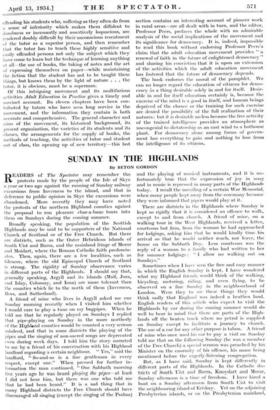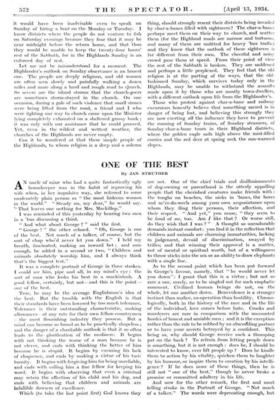SUNDAY IN THE HIGHLANDS
By SETON GORDON READERS of The Spectator may remember the protests made by the people of the Isle of Skye a year or two ago against the running of Sunday railway excursions from Inverness to the island, and that in deference to public opinion in Skye the excursions were abandoned. More recently they may have noted the protests of the northern Highland counties against the proposal to run pleasure char-a-bane tours into them on Sundays during the coming summer.
Broadly speaking, the population of the Scottish Highlands may be said to be supporters of the National Church of Scotland or of the Free Church. But there are districts, such as the Outer Hebridean islands of South Uist and Barra, and the mainland fringe of Morar and Moidart, where the Roman Catholic faith predomin- ates. Then, again, there are a few localities, such as Glencoe, where the old Episcopal Church of Scotland is strong. The rigidity of Sunday observance varies in different parts of the Highlands. I should say that, generally speaking, Argyll and its islands (Mull, Jura, and Islay, Colonsay, and Iona) are more tolerant than the counties which lie to the north of them (Inverness, Ross, and Sutherland).
A friend of mine who lives in Argyll asked me one Sunday morning recently when I visited him whether I would care to play a tune on my bagpipes. When he told me that he regularly played on Sundays I replied that pipe-playing on Sunday in the more northerly of the Highland counties would be counted a very serious misdeed, and that in some districts the playing of the pipes and the singing of non-sacred songs are deprecated even during week days. I told him the story narrated to me by a friend of his conversation with his Highland landlord regarding a certain neighbour. "Yes," said the landlord, " So-and.so is a fine gentleman in every respect, except one." When pressed for further in- formation the man continued, "One Sabbath morning live year's ago he was heard playing the pipes—at least I did not hear him, but there was one who told me that he had been heard." It is a sad thing that in many Highland districts the Free Church should have discouraged all singing (except the singing of the Psalms) and the playing of musical instruments, and it is un- fortunately true that the expression of joy in song and in music is repressed in many parts of the Highlands today. I recall the unveiling of a certain War Memorial, when many people kept away from the ceremony because they were informed that pipers would play at it.
There are districts in the Highlands where Sunday is kept so rigidly that it is considered an offence to walk, except to and from church. A friend of mine, on a walking tour in the West Highlands, received a .letter, courteous but firm, from the woman he had approached for lodgings, asking him that he would kindly time his arrival so that he would neither reach, nor leave, the house on the Sabbath Day. Less courteous was the reply. of a woman to a family who had written to her for summer lodgings : "I allow no walking out on Sundays."
Sometimes when I have seen the free and easy manner in which the English Sunday is kept, I have wondered what my Highland friends would think of the walking, bicyeling, motoring, riding, and even flying, to be observed on a fine Sunday in the neighbourhood of London. Were they to see these things they would think sadly that England was indeed a heathen land. English readers of this article who expect to visit the Highlands by car during the coming summer would do well to bear in mind that there are parts of the High- lands off the beaten track where no petrol is supplied on Sunday except to facilitate a journey to church. The use of a car for any other purpose is taboo. .A friend of mine who once used his car to pay a visit on Sunday told me that on the following Sunday (he was a member of the Free Church) a special sermon was preached by his Minister on the enormity of his offence, his name being mentioned before the eagerly-listening congregation.
But, as I have said, Sunday is kept differently in different parts of the Highlands. In the Catholic dis- tricts of South Uist and Barra, Knoydart and Morar, Sunday afternoon is a time of freedom. I have hired a boat on a Sunday afternoon from South Uist to visit the neighbouring island of Eriskay. Yet on the adjoining Presbyterian islands, or on the Presbyterian mainland, it would have been inadvisable even to speak on Sunday of hiring a boat on the Monday or Tuesday. I know districts where the people do not venture to fish on Saturday evenings because they fear that it may be near midnight before the return home, and that thus they would be unable to keep the twenty-four hours' rest of the Sabbath, for in the Highlands Sunday is an enforced day of rest.
Let me not be misunderstood for a moment. The Highlander's outlook on Sunday observance is an honest one. The people are deeply religious, and old women are often seen slowly and painfully walking a dozen iiiiles and more along a hard and rough road to church. So severe are the island storms that the church-goers arc sometimes storm-stayed in the church. On one occasion, during a gale of such violence that small stones were being lifted from the road, a friend and I who were fighting our way to church came upon the Minister lying completely exhausted an a sheltered grassy bank ; it was only with our assistance that he could proceed. Yet, even in the wildest and wettest weather, the churches of the Highlands are never empty.
- Can it be wondered at that these simple people of the Highlands, to whom religion is a deep and a solemn thing, should strongly resent their districts being invaded by char-a-banes filled with sightseers? The char-a-bancs perhaps meet them on their way to church, and scatter them (for the Highland roads are narrow and tortuous, and many of them are unfitted for heavy 'bus traffic) and they know that the outlook of these sightseers is far different from their own. The cheerful and noisy crowd pass them at speed. From their point of view the rest of the Sabbath is broken. They are saddened and perhaps a little perplexed. They feel that the old religion is at the parting of the ways, that the old- fashioned Sunday, which survives today only in the Highlands, may be unable to withstand the assaults made upon it by those who are mostly town-dwellers, with a different outlook upon life from the Highlander's.
Those who protest against char-a-bane and railway excursions honestly believe that something sacred is in danger of being lost, and believing this strongly they are now exerting all the influence they have to prevent the finning of Sunday trains, of Sunday steamers, of Sunday char-a-bane tours in their Highland districts, where the golden eagle sails high above the mist-filled corries and the red deer at spring seek the sun-warmed slopes.

















































 Previous page
Previous page